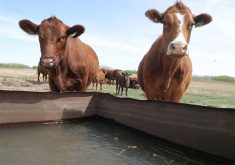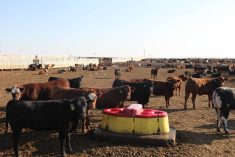CANMORE, Alta. – A cow can be led to the feed bunk, but it can’t be forced to eat.
As fussy as a stubborn six-year-old child, if a cow does not like the feed put before it, it won’t eat, no matter how nutritious the ration.
“In order to be effective, the cow has to eat it,” said researcher Dave Christensen at an international alfalfa dehydrators conference in Canmore earlier this month.
In palatability studies, the University of Saskatchewan animal nutritionist has seen cows pick through a tub of feed, eating the good bits and leaving behind dehydrated alfalfa pellets or cubes they don’t like.
Read Also

Dry summer conditions can lead to poor water quality for livestock
Drought conditions in the Prairies has led to an decrease in water quality, and producers are being advised to closely monitor water quality for their animals.
“If we leave two kilograms of dehy in a total mix ration, we can recover 1.9 kg of dehy in the feed bucket the next day with everything else consumed,” he said.
These observations led him to start conducting palatability and preference studies for alfalfa products eight years ago.
“I assumed if you put something before a dairy cow in a total mixed ration she would eat everything that was there, but we have individual cows who can sort out anything they don’t like,” he said.
Cows rate feed by taste, smell, touch, sight and experience, Christensen said. If cattle didn’t like it before, they probably won’t learn to like it.
They can separate the parts they like and leave them untouched, he added, or they can spit it out.
Early feeding trials found cows rejected some dehydrated products.
“Cows become connoisseurs of dehy pellets and alfalfa cubes.”
For high-producing dairy cows, it is crucial they eat the right measure of protein, fibre and energy to maintain health and body condition.
A cow needs fibre, carbohydrates and 10 essential amino acids including cystine, lysine and methionine. Dehydrated alfalfa can be a good source, if the cow eats it.
Feed plants are developing better-tasting mixes that still provide essential nutrients.
Researchers also know cows prefer longer cubes over shorter ones, hard cubes over soft ones, and don’t like dried feed if there are a lot of fines present.

















